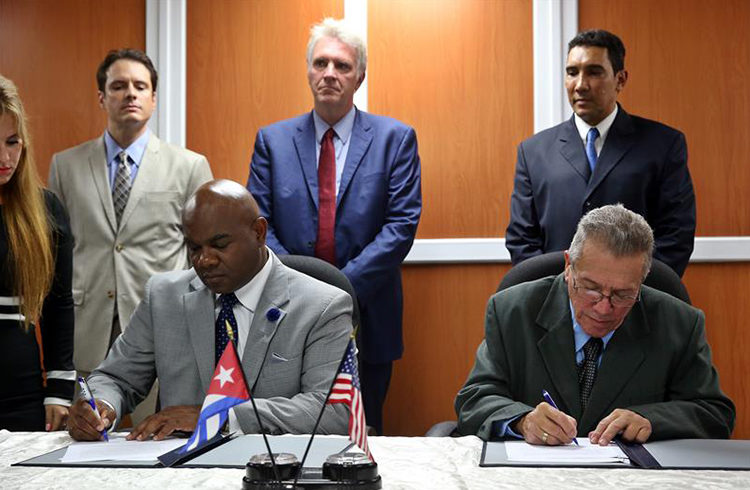The Port Authority of Cleveland and Cuba’s Maritime Administration this Friday signed a Memorandum of Understanding in Havana seeking to promote commercial relations between Ohio and Havana.
The agreement is the ninth between the island and U.S. port authorities and the first signed by institutions from both countries after the recent measures of the Donald Trump administration against Cuba that have “cooled” bilateral relations.
The document was signed by Darrell McNail, president of the Board of Administration of the port of Cleveland, and Captain José Joaquín Prado, general director of Cuba’s Maritime Administration.
Darrell McNail (left), president of the Board of Administration of the port of Cleveland, and Captain José Joaquín Prado, general director of Cuba’s Maritime Administration, exchange the signed documents. Photo: Alejandro Ernesto / EFE.
According to the official release of the Cuban Ministry of Transportation (MITRANS), the memorandum seeks to strengthen the economic-commercial ties between the two countries, and also comprises “the exchange of studies and information that will make it possible to improve and increase the levels of services provided to ships.”
Darrell McNail assessed the agreement as “a great opportunity to promote trade between Ohio and Cuban companies.” The executive of the port of Cleveland said he expected there will be “new commercial possibilities” even though he understands “there are challenges for the development of trade with Cuba.”
In relation to the latest decisions of the U.S. government with respect to the island, McNail affirmed that his institution does not judge the situation from the political standpoint but rather from a commercial point of view.
“We are not politicians. Our job is not to try and interpret what our government has to say,” he said. “We do feel that the trade relationship will perhaps take a bit longer to boost because of this week’s events, we don’t have a crystal ball to know it. But we understand that relations will develop over time, if not today, maybe tomorrow.”
“Our intention is to continue promoting business with Cuba,” he confirmed.
Meanwhile, José Joaquín Prado affirmed that “Cuba and U.S. ports have common interests in maritime development” and he said he was sure “that sooner rather than later” more bilateral relations will develop.
“This type of agreement represents a benefit for both countries,” he commented. “Cuba has a privileged position, important maritime routes pass close to our coasts, from north to south as well as from east to west and the nine memorandums we have signed with U.S. ports are convenient and reasonable for them as well as for us.”
Captain Prado explained that at this moment action plans are being outlined to put into practice the agreements already signed and said that work is underway in the realization of more agreements
“We are expecting new agreements,” he pointed out.
Among the benefits Cuba offers to its counterparts in the United States, MITRANS lists the establishment by the island of laws that regulate maritime, fluvial and lacustrine navigation, as well as port activities. There is also legislation for the protection of the environment and especially the marine ecosystem.
In addition, it belongs to the Regional Coordination Operative Network of Maritime Authorities and other regional instruments and agencies, and it meets the demanded standards established by them.
Cuban ports are certified according to the International Ship and Port Facility Security (ISPS) Code, while there are plans to implement an extensive program of development of the necessary infrastructure for the activity of cruise ships and freight transportation.
Located at the mouth of the Cuyahoga River in Lake Erie, the port of Cleveland is one of the most important of the zone of the Great Lakes. It is in charge of a major part of the shipments of raw materials for regional manufacturing, as well as the export of some local resources, among them the salt extracted from Lake Erie and agricultural products from Ohio.
Before the signing of the memorandum with the Port Authority of Cleveland, the Cuban authorities had already signed agreements with the U.S. ports of Houston, Virginia, Louisiana, Lake Charles, New Orleans, Alabama, Mississippi and Pascagoula.










